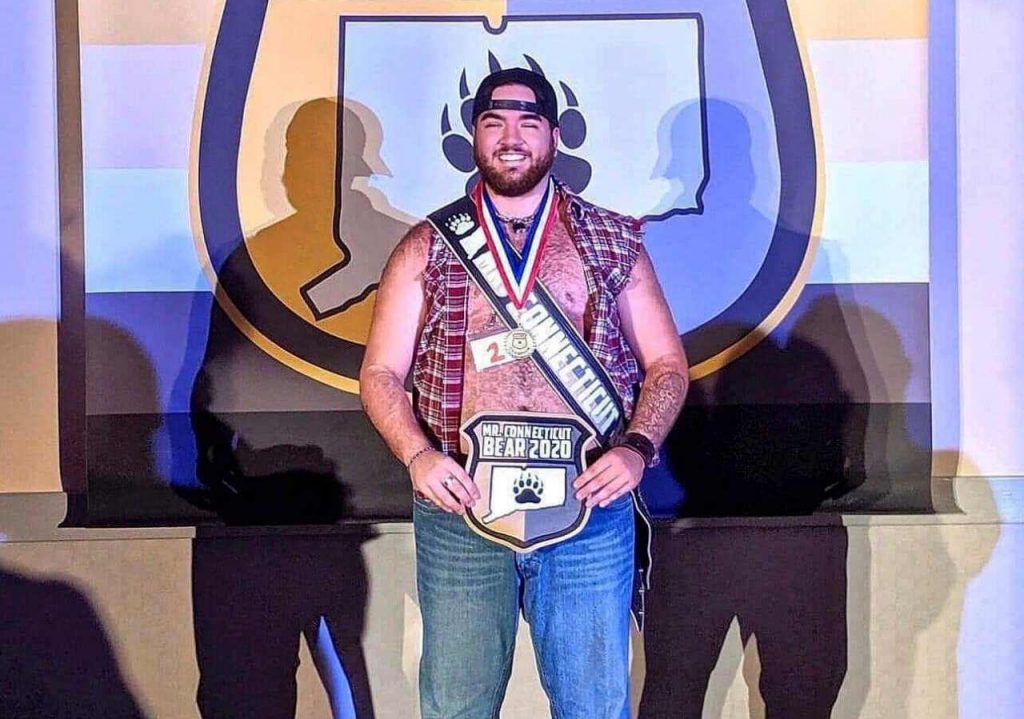
Kyle Meets… Kylar Maldonado, Connecticut’s Youngest and Openly Transgender Bear Titleholder
For a long time, the leather and bear communities – two separate, but closely related gay subcultures – have both seemingly been governed by overly masculine stereotypes, steeped in unyielding old guard leather traditions. It has sometimes seemed impossible to allow anyone who falls outside of the traditional, white, cisgendered, “man’s man” persona to have a moment in the spotlight without many challenging their right to be there and hold space.
For this reason, many have been stepping up to plate to represent the underrepresented, while challenging the lack of acceptance and diversity in communities that were themselves borne of a need for inclusion and acceptance.
I recently got a chance to chat with Kylar Maldonado – Mr. Connecticut Bear 2020 – to discuss how he went from surviving an abusive relationship to making history as Connecticut’s youngest transgender titleholder.
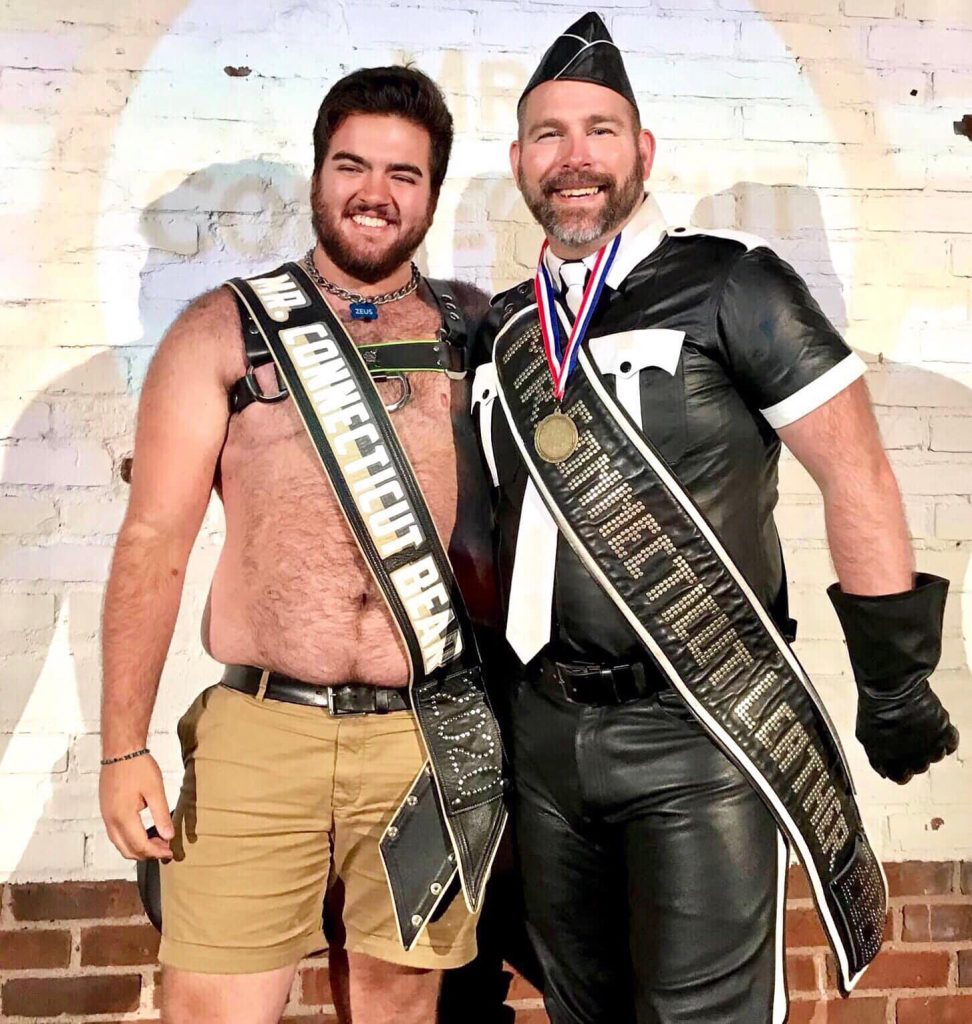
Kylar and Mark Richards – Mr. Connecticut Leather 2020 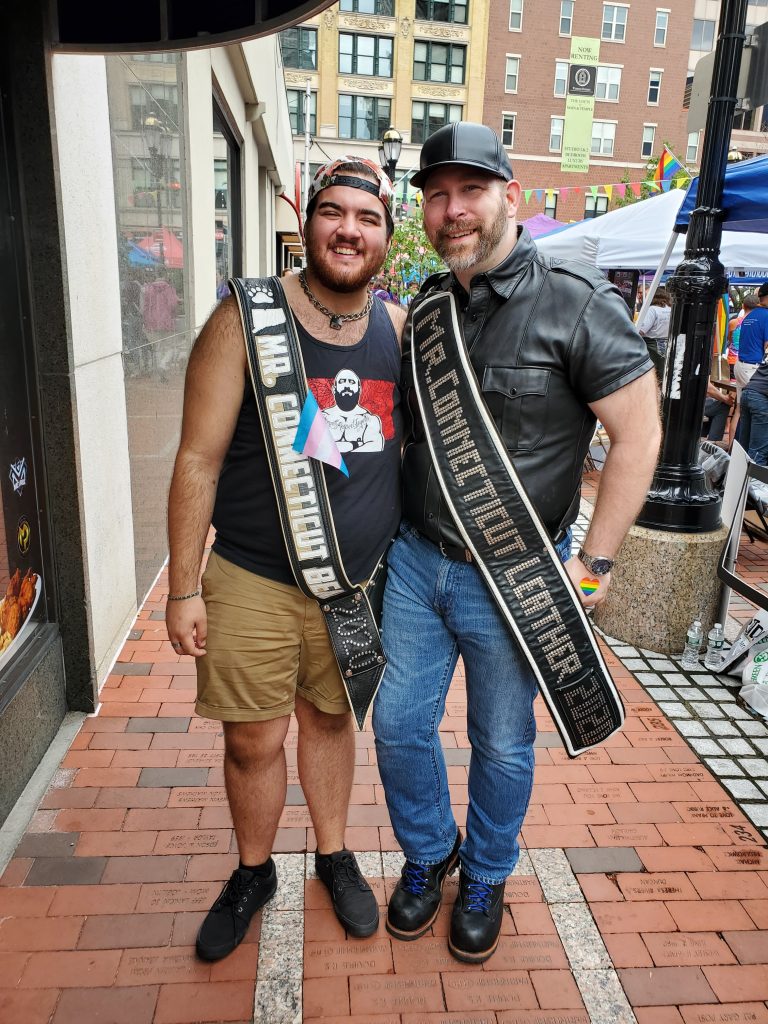
Kylar and Mark Richards at Hartford Pride
KJ: Hi Kylar! Can you tell us a bit about you?
KM: Hi there! As you know, I recently won Mr. Connecticut Bear 2020 contest, and I’m proud to be Connecticut’s newest, and youngest titleholder, at 21 years-old. I am also honored to have become the world’s second and youngest openly transgender man to win a bear title.
Professionally, I’m a development trainer for the LGBTQ+ community with GLSEN Connecticut. When I am not working, I enjoy hiking, traveling, or practicing partner acrobatics with my handsome partner, Eddie. I can do all of this thanks to having an amazing support network in my life, which includes my beautiful mother, Kimberly Burr.
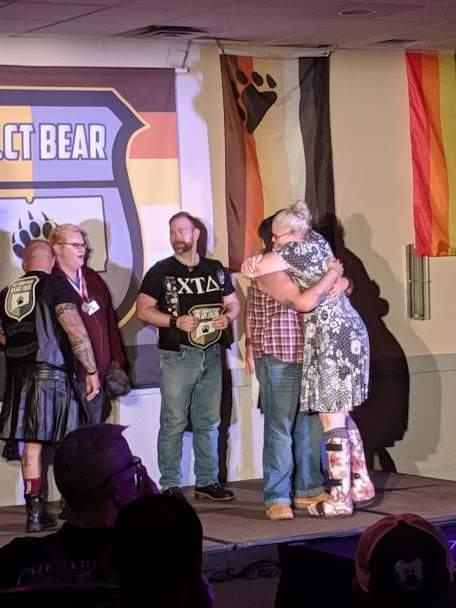
Kylar’s mother, Kimberly Burr, hugging him on stage during the contest. 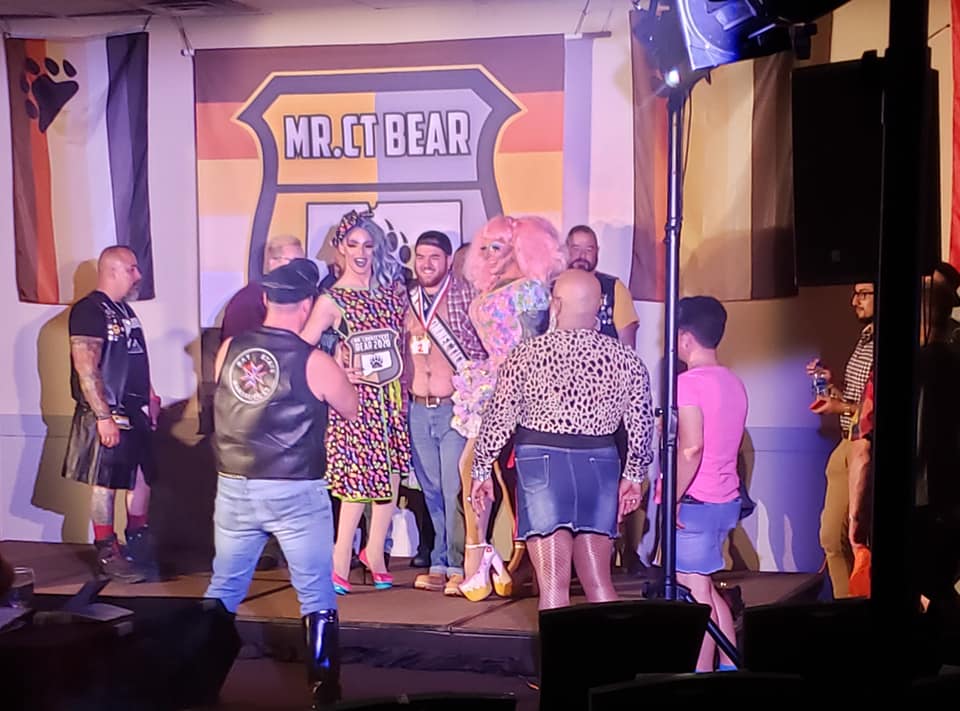
Kylar and drag friends after win.
KJ: What made you enter the Competition?
KM: I have wanted to compete since I was 17. At the time, I was really questioning my sexuality and gender identity, and during a pride event I met Mr. Connecticut Bear 2014, Trell Walters. For an odd reason that I didn’t realize at the time, I was in awe and had such a connection to the title patch on the back of his vest.
I don’t know if I was in awe because of the identity that came with the patch, the sash & vest, or the publicity of holding the title – or just the fact that I could become a local gay icon. But one thing was for sure – I wanted to become a Connecticut Bear. (laughs)
Years passed by, as I twiddled my thumbs and waited for the day when I finally hit the entry age of 21.
A lot has changed in the intervening years. I mean, even as recently as February, I was unsure if I was ready to compete. I had finally gotten out of an extremely abusive relationship, which lasted two years too long. This really dimmed my light. I felt like I didn’t matter. I had a hard time seeing myself as a public figure, let alone a representative of our community.
Initially, I had intended to take a year to heal and relight my flame that had been snuffed out. I didn’t realize what kind of blaze I would become, or how quickly it would happen.
I remember once while on a trip to New York, my partner, Eddie, was fixing his tie in the mirror, as I stood behind him near the bed. He must have been watching me adjust my leather suspenders, because he turned to me and asked if I had signed up for the contest.
I told him all the reasons why I didn’t. I clearly remember him saying, “Babe, apply for it. You have been talking about this since we got together, and I know you have been thinking about it for years. Just apply.” And that’s what did it. (laughs)
I wanted to make sure that I was emotionally and physically prepared for what I wanted to represent on that stage. I wanted to be the best representation for the many different communities I stand for, and I wanted the bear community to be aware of that.
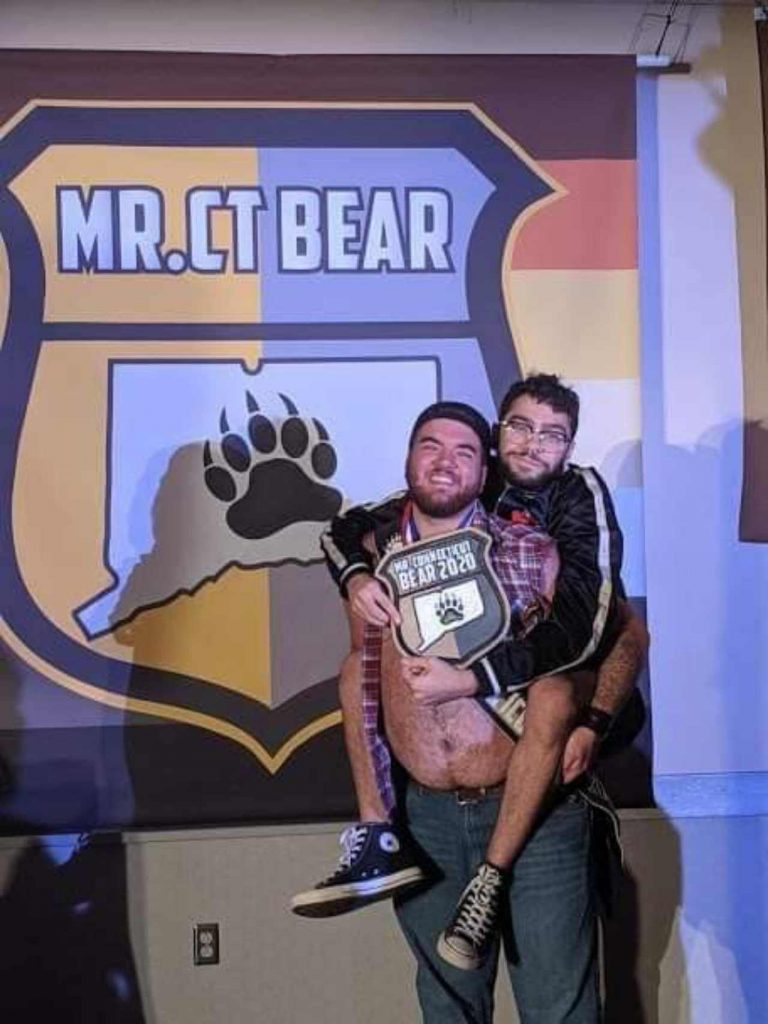
Kylar and his partner, Eddie. 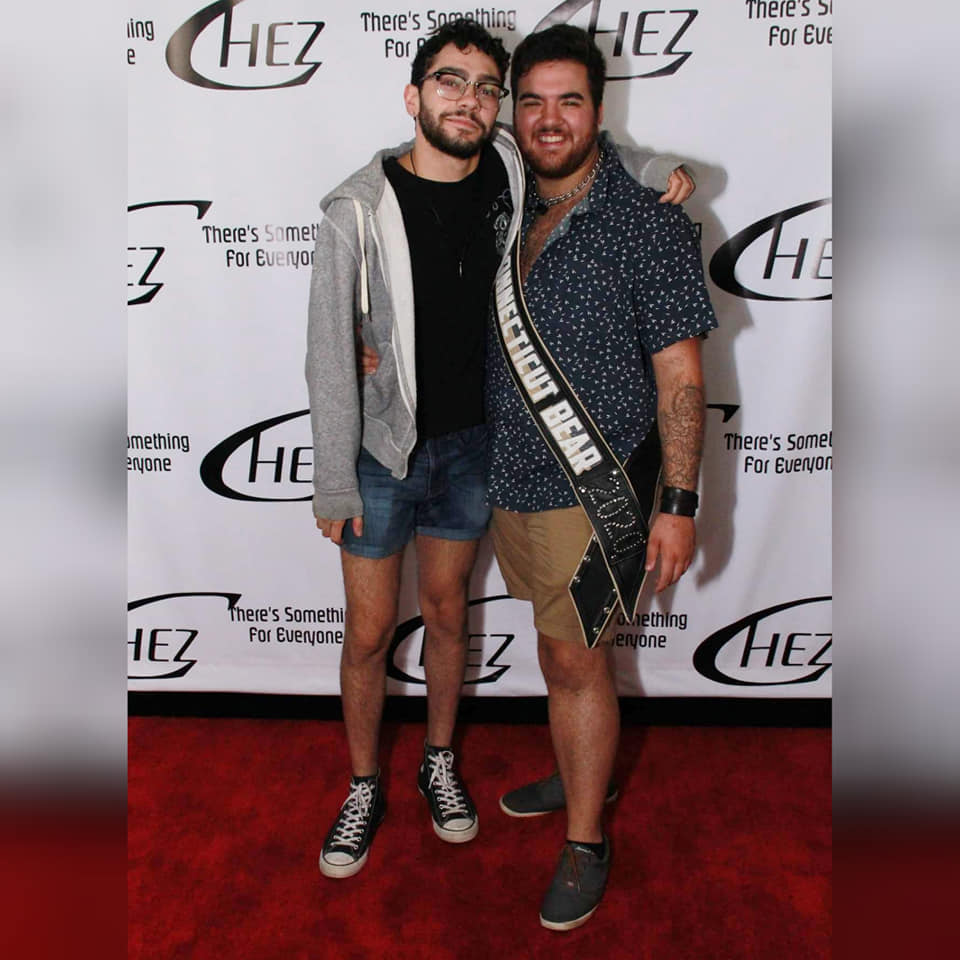
Kylar and his partner, Eddie.
KJ: This is all really exciting news! How does it feel to know that you are now a part of bear history? Do you feel that your win is helping to open doors and spark much needed change in the community?
KM: It didn’t feel real until I saw my face on a poster at my home bar, Chez Est, in Hartford, Connecticut. I am proudly representing what it means to me to be a young, queer, Latino transgender bear in a traditionally older, white, cisgender, gay, male contest.
I do feel that my win is bringing out more people that have felt alone, or people that may have worried just the same as I have. I worried about how the crowd may react to a transgender contestant, how the judges would react to my leather bear life being brought into my looks, and I worried whether or not I would be able to fight my own mental health (especially my anxiety) during my timed speech.
As soon as I walked off that stage, my friends and allies told me that they wanted to compete next year, and that I gave them hope that things were changing. They said that we, as trans people, won’t be pushed aside anymore. I won the contest by being unapologetically true to myself. People can now look to me as proof that we will be seen and heard as we are, without compromise.
KJ: What is your platform?
KM: Acceptance and inclusivity for all is my platform. Now that I have been given a stage to speak from, I hope I can continue to raise awareness of the concept of intersectionality for all identities. We all have different identities. “Bear”, for instance, is a self-imposed identity used to tell the larger LGBTQ community that you have a set of secondary sex characteristics that set you apart from others.
People are complex and, in most cases, don’t identify as one single thing. For instance, I am a two-year domestic abuse survivor, a young cub, a leather pup, and a drag queen groupie who is also gay, Latino, and transgender. All of these things are part of what makes me who I am.
The community is small, and some detractors may feel that labeling oneself further shrinks the community. I believe the opposite to be true. Through self-identification you give everyone specific language to describe you, and are able to meet new people and immediately understand the ways in which you are similar or different. This ability, brought about by accepting all identities and their intersections, brings people together on a deeper level, and keeps you from judging a book by its cover.
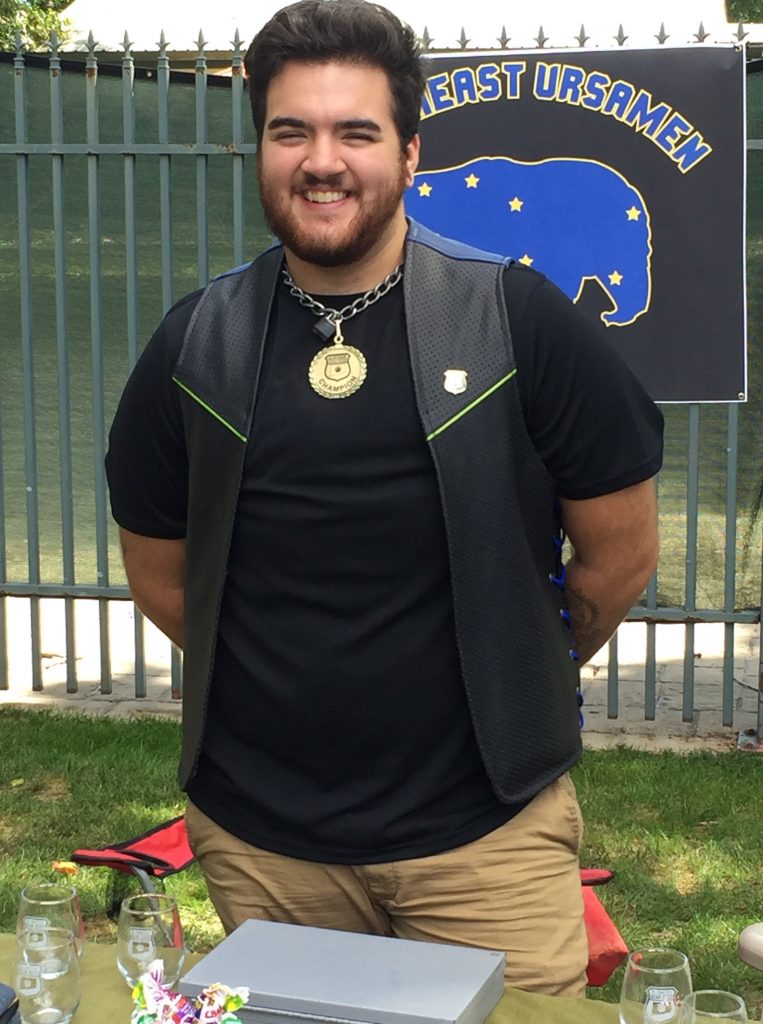
Kylar at Six Flags Pride Fest 2019 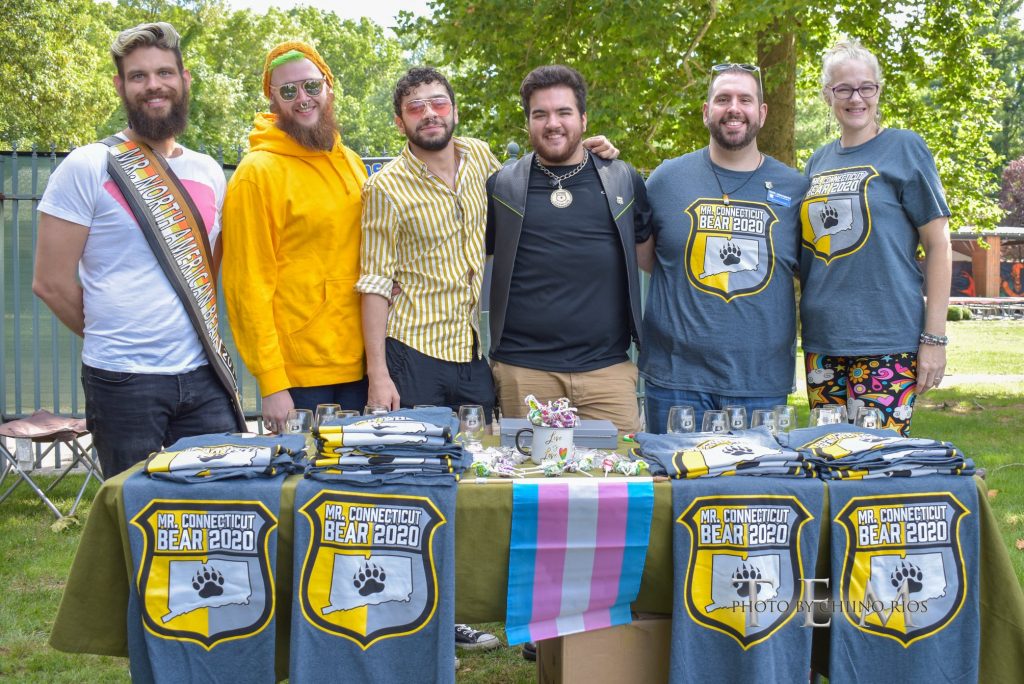
Kylar and team at Six Flags Pride Fest 2019
KJ: What is the most important thing about the bear community for you? Do you feel that bears of color are properly represented in the bear community?
KM: Ever since I was finally respected and admired in the bear community as I am – which has been the past two out of almost five years of my transition – I have gained a wealth of knowledge, guidance, understanding, and a family that has made me feel safe. I know I can take my shirt off at a bear night and no one will laugh at me for the odd amounts of hair on places I can’t see without a mirror. (laughs)
I will definitely say that not everyone in the bear community is this way, but the people I have been lucky enough to stumble upon and have in my life have been affirming. I’m thankful for my team, who helped me in this contest. They are basically chosen family to me – people such as Ace, Mark, George, Tim, and many others that have been my “guardians” in this community.
I have dealt with the hate, being labeled a “deceiver” in the community. I’ve been told that they’d much rather have a twink with a dick than a bear with an extra hole, or that I need to not have back hair if I want to go to the beach with them, and so much more.
Often times, when I am shirtless and my scars are seen, I know I will either be asked to educate someone or they will mention that I am safe with them because they have a family member that is trans and they don’t want me to get hurt. In my experience, this is generally hard to find in the gay community these days. My safety is very important, and I have found safety around the majority of the people in my area.
I do feel that bears of color are rarely represented in the bear community, and I don’t believe that it is our fault. It is because of the people who do the majority of the advertising for bear themed events. Even though I am someone who passes for white, I am also half Puerto Rican, and it’s very frustrating being the only POC representation at some events.
I have talked to friends and found that it is mainly due to how marketing and media caters to specific demographics/populations at these events. If you put white, fit, traditionally hairy, muscle bear models on a poster, will you attract other folks that may not look like that? Will you attract young Latino bears like me, who are super hairy with more of a stomach than biceps? Will you attract a Black Otter? Will you attract a chubby, hairless babe?
I once went to a rather popular transgender conference where I met a bunch of other beautiful trans people, but was torn apart on social media after posting a photo of all of us online the next day. It was a photo of 8 of us; we were trans (masc and femme), we were nonbinary, we were queer and straight, and we were of many different racial and ethnic backgrounds. Some of us were hairy and some were not. We were in our 20s to mid 30s, some fit and some chubby. We were pre and post-op, and a whole bunch of other identities – seen and unseen.
But then a popular trans magazine shared the photo, and the editing team of the magazine put a filter over the photo that made it look rather “white washed”. We were called white, straight, masculine trans men. We all immediately jumped to our defense and began claiming our identities.
But if that magazine had shared our photo without the edit, allowing everyone’s body and identity to be accurately represented, I feel that people would have come more from a place of acceptance and less from a place of judgement. They would have been willing to read that magazine. So why don’t we do the same when marketing for events?
I have many other QTBIPOC (Queer, Trans, Black, Indigenous People of Color) friends that refuse to go to certain pride events because the marketing materials from previous years only show traditionally attractive, white, cis gay folks. I would have to agree. But, in the end, I also go to these events in order to be a representative for my community and my friends, and to show people that we should be there too.
KJ: Will you go on to enter other competitions?
KM: I do hope to compete in future competitions like North American Bear and World Bear, but only when I feel that I have earned a spot on that stage. I would like to do right by Connecticut and make them proud by working closely with the communities here first, before moving onto the next step.
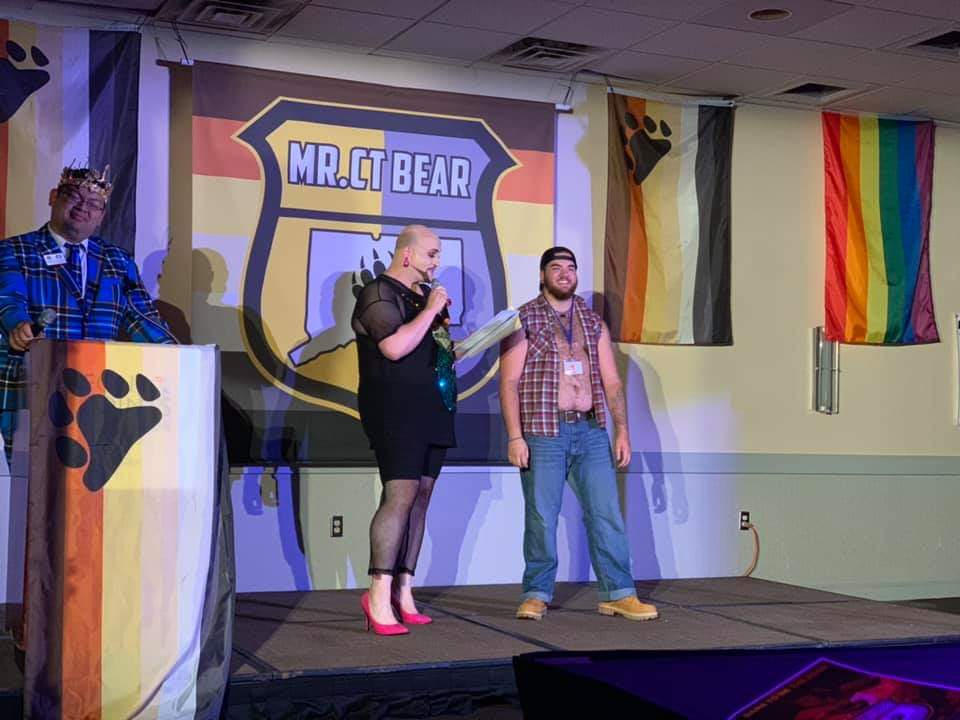
Kylar’s Bear Look – Mr. CT Bear Contest 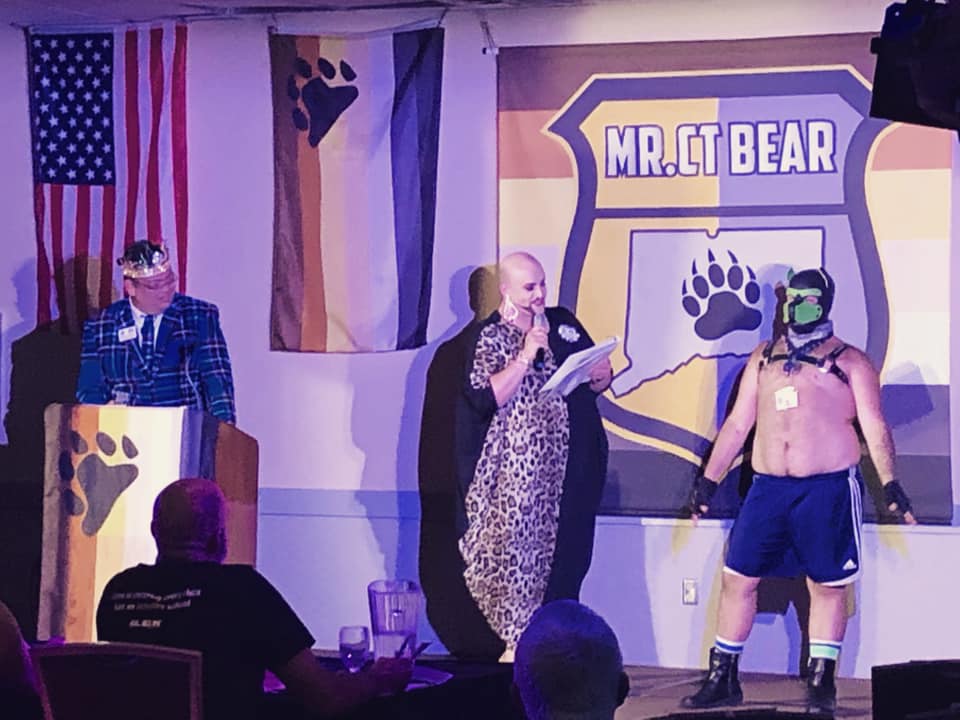
Kylar’s Hot Look – Mr. CT Bear Contest 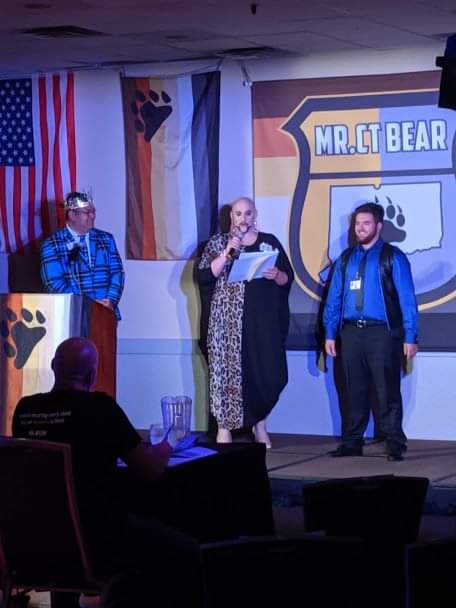
Kylar’s Formal Look – Mr. CT Bear Contest
KJ: What are your plans for your title year?
KM: I am looking forward to meeting new people from all over, not just from Connecticut. I would like to expand Connecticut’s community because, though we may be small, we are definitely mighty. We are a state full of knowledgeable, amazing, and unique people.
I hope to go to more out-of-state bear nights, and create more events that are 18 and over. I even hope to create family friendly events at coffee shops, or even a charity car wash for the community. I would like to create something that will not only raise money, but also promote body positivity.
It would also be cool to make a Bears and Babes event that features drag queens, leather daddies, pups, and more! I plan on expanding the community and bridging the gap by bringing all these communities together, whether it be with fun, charity, food, or caffeine!
KJ: Finally, what’s your advice for anyone entering next year?
My advice for anyone who would like to enter next year is to just remember to be true to you. Does body hair cover your whole body or just your chest? Cool! Are you at any stage of your transition? Rad! Do you want to wear make up? Do It! Do it! Wanna wear leather ? Yes, please! Are you 21 or 43 and want to compete? Go for it.
Don’t let anyone try to steer you away from living authentically. If it makes you happy and doesn’t hurt anyone, I am all for it. Make choices that are true to you.
Watch Kylar win Mr. Connecticut Bear 2020!








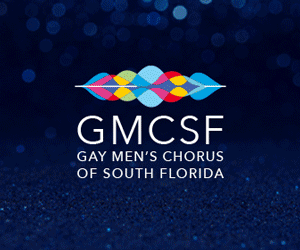



Comments are closed.